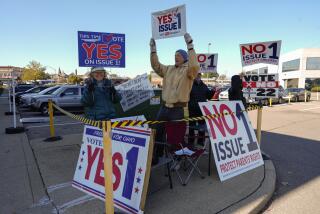Anti-Tobacco Case in One State Gutted
- Share via
The tobacco industry, facing lawsuits by 22 states seeking to recover tax funds spent on smoking-related health care, won a victory Friday when a West Virginia trial judge said she would dismiss most of the case filed against the industry by the state’s attorney general.
Circuit Judge Irene C. Berger said in a letter to lawyers for both sides that the two state agencies that are the plaintiffs in the case do not have an independent right to sue for personal injuries caused by smoking.
Berger’s letter said she planned to dismiss 11 of the 14 counts in the suit and asked an industry lawyer to prepare a formal order for her to sign.
Her action means that in West Virginia the state’s attorneys would “have to prove each individual case from beginning to end,” said Robert Weber, an attorney for R.J. Reynolds Tobacco Co. “They would have to prove the injury, they would have to prove causation, they would have to prove damages in each individual case.”
Weber and other industry lawyers hailed the judge’s action and said it could have ramifications for cases in other states. But anti-tobacco attorneys said Berger’s decision will not have any impact beyond West Virginia, and they noted that courts in other states have ruled differently on the issue.
“We are delighted with today’s decision, which represents a significant victory for the tobacco industry and cripples the ability of the state to continue its lawsuit,” said David Bernick, national trial counsel for Brown & Williamson Tobacco Corp.
Philip Morris Cos. attorney Murray Garnick praised the judge for “following established law and applying it to this case.”
The right of a state to sue for expenditures incurred treating smokers is one of the linchpin issues of the cases filed by attorneys general around the country. The thrust of the cases is that the states have the right to recover damages just as they would for cleaning up an oil spill.
Tobacco firms have countered that a state can file suit against them only if it “stands in the shoes” of the allegedly injured smokers, meaning that the industry would be able to challenge whether individuals had been injured by smoking and what costs were incurred.
A Mississippi judge has rejected the industry’s contention, and the issue is pending or will be raised in the future in every one of these cases. The states and several localities, including Los Angeles County, hope to prove their claim through medical studies showing that smoking causes illness and statistics on the prevalence of such injuries to people who smoke.
Two leading anti-tobacco lawyers, Northeastern University law professor Richard Daynard and Susan Nial of Charleston, S.C., whose firm is serving as special counsel to many of the attorneys general, said they thought the decision will have little impact beyond West Virginia.
“If the industry is expecting a wave of dismissals, I think they may have to learn to wait very patiently,” said Daynard, co-founder of the Tobacco Products Liability Project at Northeastern University in Boston.
Nial noted that Judge Berger made a similar decision when she ruled last year that West Virginia’s attorney general could not bring the suit on his own. Subsequently, two state agencies, the West Virginia Public Employees Agency and the West Virginia Department of Health and Human Services, became the plaintiffs and the case proceeded.
Berger dismissed allegations of negligence, strict liability and fraudulent misrepresentation, among other counts. Thursday she is scheduled to hear the industry’s motion to dismiss two other counts based on the state’s antitrust and consumer protection laws.
Victor S. Woods, assistant attorney general, said he expects the judge will reject the industry’s motions on those counts because there is clear statutory authority for a state agency to sue on them.
“West Virginia is still very much alive,” he said. (The other remaining count has no major importance, Woods said.)
Nial said she took some comfort in a passage near the end of the judge’s letter: “Under the facts as alleged and assumed to be true, there can be no doubt that our State has suffered great loss in monetary damages and, more importantly, in human lives and the quality of human life. However, without proper legal remedy, there exists no claim upon which relief can be granted.”
Nial said it would be a terrible situation for a state to be injured but have no remedy. “This is a question of equity,” Nial said. “The people of West Virginia should be able to get their day in court.”
Woods said no decision has been made yet on whether the state will appeal.
More to Read
Sign up for Essential California
The most important California stories and recommendations in your inbox every morning.
You may occasionally receive promotional content from the Los Angeles Times.













